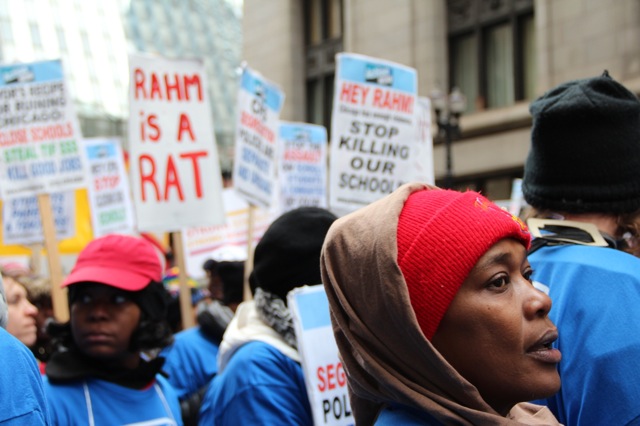
Most of the city’s labor movement is laying low or supporting the mayor in the upcoming election, despite his well-known anti-worker policies
By David Moberg
In These Times
Jan. 28, 2015 – When Rahm Emanuel strode into office as mayor of Chicago in 2011, one of his first targets was the Chicago Teachers Union (CTU). He sought and obtained state legislation limiting the right of Chicago teachers to strike. But he lost doubly in the fall of 2012: The CTU successfully mobilized its members to go on strike, then won both a good contract and the battle for public support. Yet Emanuel still closed 49 public schools and expanded charter schools the following spring. Meanwhile, other public employee unions moved into the mayor’s crosshairs as he drastically cut and privatized city jobs and services, often with help from a Democratic governor and state legislature.
Emanuel stands for re-election February 24 in a non-partisan primary against four challengers (and if no one wins 50 percent of the vote plus one, there will be a run-off between the top two on April 7). Polls suggest Chicagoans are not satisfied with their mayor, but most observers give him the odds because of his financial advantage—as of early 2015, he had a $11 million war chest, 10 times that of any opponent.
In theory, labor could be an important part of these calculations. Chicago is a more unionized city than most, and union endorsements typically come with credibility, money and an army of campaign workers. But despite Emanuel’s anti-union record, unions are divided about how to deal with “Mayor 1%,” as Kari Lydersen’s biography of Emanuel is titled.
Emanuel earned that sobriquet not only for the millions he made working for an investment bank and his gift for convincing the rich to empty their pocketbooks for the Democratic Party, but also his disdain for unions. “Fuck the UAW,” he infamously said when serving as Obama’s chief of staff during the auto bailout. He also largely shares the worldview of the financial and corporate elite: Give the hard back of the free-market hand to Jane and Joe Sixpack, the soft palm of friendly government to needy businesses.
Emanuel’s leading—but still longshot— opponent is his opposite on most counts. Cook County Commissioner Jesus “Chuy” Garcia, a former alderman and state senator, has been a member of three different unions and strongly supports labor.
“My roots are with working-class people,” Garcia said in an interview with In These Times. “I understand what working-class families need. … Chicago would be better served by a mayor who has that background and would work with unions.” He says that Emanuel’s attempts “to break the CTU” were “heartless” and “spiteful.” Those are harsh words from a man who comes off as modest, self-effacing and “genuine”— as Amalgamated Transit Union Local 308 President Robert Kelly said while endorsing him. Garcia supports the Fight for 15, wants to strengthen neighborhoods and their infrastructure and wants to replace the mayoral appointment of school board members with a board elected by Chicagoans (a major demand of the CTU).
You might imagine that unions would rally behind a seemingly pro-labor challenger to an incumbent with an anti-union record. But as of early January, Chicago’s unions were divided between Garcia, Emanuel and neutrality for a variety of reasons—some peculiar to Chicago, others typical of the U.S. labor movement’s electoral strategy.
Broad shoulder unions
Chicago’s unions, riven with thuggish political squabbles in the late 19th century, grew more unified, progressive and powerful in the first part of the 20th. They often supported labor and socialist party candidates and welcomed organizers like William Z. Foster, a Communist Party leader who led ambitious unionization campaigns in the Chicago meat-packing and steel industries. (Continued)
Continue reading Rahm Emanuel Is a Union-buster. So Why Are Chicago Unions Backing Him?


 There were local and geographical peculiarities, but when an
There were local and geographical peculiarities, but when an  By Bill Fletcher, Jr
By Bill Fletcher, Jr